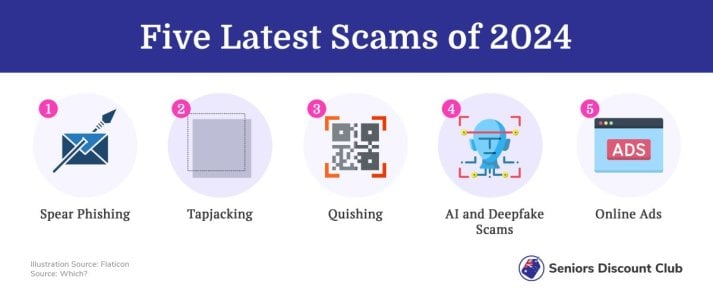Protect your wallet: Discover these stealthy scams before it's too late!
By
Seia Ibanez
- Replies 27
Scammers have always been a menace, using tactics such as phone calls, text messages, emails, social media requests, and even traditional letters to trick people into parting with their money.
While some scams are glaringly obvious, like the infamous 'Nigerian prince' scam, others are more subtle and sophisticated, making them harder to spot.
Now more than ever, it's crucial to stay informed about the latest scams to protect your hard-earned money.
According to consumer experts at the United Kingdom consumer group Which?, shared exclusively with UK website This Is Money, there are five new scams you may not be aware of but could potentially fall victim to this year.
Which? Consumer Law Expert Lisa Webb said, 'Consumers can stay on top of the tactics used by fraudsters by signing up to our scam alerts service—which highlights the latest frauds making the rounds.’
'Responsibility should not fall solely on the shoulders of consumers. Tech platforms and the Government need to up their game and better prevent scammers [from] reaching potential victims.'
Let’s delve into these five new scams and how they work, along with tips on how to avoid them.
1. Spear Phishing: A New Twist on an Old Scam
You're probably familiar with phishing scams, where fraudsters send out mass emails pretending to be reputable businesses or government bodies, hoping that a few recipients will take the bait.
However, scammers have refined this tactic with a more targeted approach known as 'spear phishing'.
In spear phishing, scammers use personal information obtained from data breaches, social media profiles, or previous scams to launch targeted attacks, making their communication seem more legitimate.
Remember, legitimate organisations rarely cold call to ask for sensitive information. If you're unsure, hang up and call the company back on its official number.
2. Tapjacking: An Invisible Threat
Tapjacking is a new form of scam where fraudsters hijack your smartphone screen, tricking you into performing actions without your knowledge.
This scam works by displaying a clickable overlay on your phone screen. However, what you're actually tapping on could be making in-app purchases or signing up for a subscription via an invisible screen beneath the overlay.
To avoid this, stick to apps downloaded from trusted sources like the Apple App Store or Google Play Store, and always read reviews before installing.
3. Quishing: The QR Code Scam
Quishing is a spin-off of phishing that exploits the QR code technology we've all become accustomed to during the COVID-19 pandemic.
Scammers use QR codes to direct victims to fake login pages or sign them up for expensive subscriptions without their knowledge.
Be wary of QR codes sent via email or stuck to public facilities like parking meters.
4. AI and Deepfake Scams: The Rise of Misinformation
The rapid advancement of artificial intelligence (AI) has given scammers a new tool to exploit: deepfakes.
These scams use AI to create convincing impersonations of real voices and faces, spreading misinformation and promoting fake investments.
Hollywood actor Russell Crowe earlier found himself at the centre of a scandal when a Maltese real estate firm used a deepfake video of him to promote their properties.
A 66-year-old woman was also deceived by a deepfake romance scam that lasted two years. The suspicion of the scam was confirmed when a reverse image search revealed that the video sent to her was created using a photo of Andre Moreau, an Emmy-winning news anchor in the US.
According to Facebook and Instagram owner Meta, it will install labels to inform users if a video has been detected as AI.
5. Online Ads: The Hidden Danger
While the Online Safety Act 2021 aims to hold large online platforms accountable for illegal content, including scam adverts, the change is yet to be fully implemented.
Be cautious of adverts offering deals that seem too good to be true, and always check if the web address matches the advert.



You can head to our Scam Watch forum to stay updated with the latest tricks scammers use to deceive people out of their money and sensitive details.
Have you encountered any of these scams? Share them with us in the comments below.
While some scams are glaringly obvious, like the infamous 'Nigerian prince' scam, others are more subtle and sophisticated, making them harder to spot.
Now more than ever, it's crucial to stay informed about the latest scams to protect your hard-earned money.
According to consumer experts at the United Kingdom consumer group Which?, shared exclusively with UK website This Is Money, there are five new scams you may not be aware of but could potentially fall victim to this year.
Which? Consumer Law Expert Lisa Webb said, 'Consumers can stay on top of the tactics used by fraudsters by signing up to our scam alerts service—which highlights the latest frauds making the rounds.’
'Responsibility should not fall solely on the shoulders of consumers. Tech platforms and the Government need to up their game and better prevent scammers [from] reaching potential victims.'
Let’s delve into these five new scams and how they work, along with tips on how to avoid them.
1. Spear Phishing: A New Twist on an Old Scam
You're probably familiar with phishing scams, where fraudsters send out mass emails pretending to be reputable businesses or government bodies, hoping that a few recipients will take the bait.
However, scammers have refined this tactic with a more targeted approach known as 'spear phishing'.
In spear phishing, scammers use personal information obtained from data breaches, social media profiles, or previous scams to launch targeted attacks, making their communication seem more legitimate.
Remember, legitimate organisations rarely cold call to ask for sensitive information. If you're unsure, hang up and call the company back on its official number.
2. Tapjacking: An Invisible Threat
Tapjacking is a new form of scam where fraudsters hijack your smartphone screen, tricking you into performing actions without your knowledge.
This scam works by displaying a clickable overlay on your phone screen. However, what you're actually tapping on could be making in-app purchases or signing up for a subscription via an invisible screen beneath the overlay.
To avoid this, stick to apps downloaded from trusted sources like the Apple App Store or Google Play Store, and always read reviews before installing.
3. Quishing: The QR Code Scam
Quishing is a spin-off of phishing that exploits the QR code technology we've all become accustomed to during the COVID-19 pandemic.
Scammers use QR codes to direct victims to fake login pages or sign them up for expensive subscriptions without their knowledge.
Be wary of QR codes sent via email or stuck to public facilities like parking meters.
4. AI and Deepfake Scams: The Rise of Misinformation
The rapid advancement of artificial intelligence (AI) has given scammers a new tool to exploit: deepfakes.
These scams use AI to create convincing impersonations of real voices and faces, spreading misinformation and promoting fake investments.
Hollywood actor Russell Crowe earlier found himself at the centre of a scandal when a Maltese real estate firm used a deepfake video of him to promote their properties.
A 66-year-old woman was also deceived by a deepfake romance scam that lasted two years. The suspicion of the scam was confirmed when a reverse image search revealed that the video sent to her was created using a photo of Andre Moreau, an Emmy-winning news anchor in the US.
According to Facebook and Instagram owner Meta, it will install labels to inform users if a video has been detected as AI.
5. Online Ads: The Hidden Danger
While the Online Safety Act 2021 aims to hold large online platforms accountable for illegal content, including scam adverts, the change is yet to be fully implemented.
Be cautious of adverts offering deals that seem too good to be true, and always check if the web address matches the advert.

Tip
How to stay safe from scams in 2024, according to Which?:
1. Be wary of unsolicited contact: Legitimate businesses rarely contact you out of the blue asking for personal information. If you're unsure, contact the company directly using verified contact details.
2. Check website addresses: When contacting your bank or similar companies, use the website address on your bank card or statements. Be cautious of search ad scams that can appear at the top of search engine results.
3. Report any suspicions: If you think you've been scammed, report it to Scamwatch or call the police. If you're worried the scammer has your financial details, contact your bank immediately.
1. Be wary of unsolicited contact: Legitimate businesses rarely contact you out of the blue asking for personal information. If you're unsure, contact the company directly using verified contact details.
2. Check website addresses: When contacting your bank or similar companies, use the website address on your bank card or statements. Be cautious of search ad scams that can appear at the top of search engine results.
3. Report any suspicions: If you think you've been scammed, report it to Scamwatch or call the police. If you're worried the scammer has your financial details, contact your bank immediately.
Key Takeaways
- Which? experts warn of five new scams to be vigilant about in 2024, including 'spear phishing' and 'tapjacking'.
- Consumers are encouraged to sign up for scam alert services and remain sceptical of unsolicited communications.
- Scammers are utilising advanced technology such as AI and deepfakes to create more convincing frauds.
- To avoid scams, it's advised to be wary of cold calls, verify web addresses and contact details, and report any suspicious activity to authorities.
Have you encountered any of these scams? Share them with us in the comments below.








